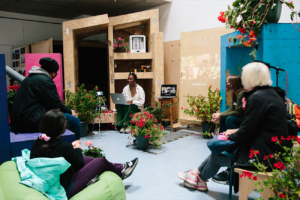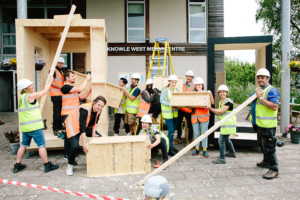Knowle West Media Centre

Hybrid Nature Workshop with Emma Blake Morsi as part of the ‘Come Together’ programme. Photo: Ibolya Fehrer.
Since 2002, Knowle West Media Centre (KWMC) has used arts and technology to reflect the vibrancy of its community and support people to make positive social change. As an arts centre and charity based in a South Bristol housing estate, community is at the heart of everything it does.
Its origins trace back to a local residency project in 1996 by Carolyn Hassan, the CEO and Founder of KWMC, who was commissioned to look at the connection between arts and health. She used photography and filmmaking to explore the democratising nature of media – handing over cameras to community members to capture their perspectives.
Today, the ethics and mission of KWMC remain the same – trying to make do with what they have and putting tools in the community’s hands. But the range of tools has changed a lot, and KWMC embraces technology to help people create, respond and make exciting things happen. The organisation is committed to working collaboratively with people from diverse backgrounds to develop new skills, confidence and ideas, and empower them to become change-makers too.
Democratising knowledge
Creating space for underrepresented voices has always been as a part of KWMC’s work. Many years ago, the organisation discussed the topic of ‘knowledge’ with artist Suzanne Lacy and the Knowle West community. They reflected on the hierarchy of ‘knowledge’ – such as why some kinds of knowledge, especially from universities, is regarded as higher than lived experiences.
The ‘University of Local Knowledge’ was born out of this reflection – a co-created website allowing local people to make and share ‘pieces’ of knowledge. The idea was to present a community body of important embodied and lived knowledge. The team also created around 960 short films with people talking about their expertise in different fields, from how to pluck a pheasant to how to read somebody’s palm. “It’s supporting people to tell their story confidently. This is really important in co-creation practice to build confidence,” Carolyn said.
The KWMC team saw that when they brought together people’s passions and expertise, thoughts of ‘who holds knowledge’ or ‘who knows what’ started to change, and communities can even challenge this type of hierarchy themselves simply by sharing. The project ran for over eight years as a collaboration with Lacy.

A community team coming together to construct modular blocks for WeCanMake. Photo: Ibolya Fehrer.
Bringing more people into the room
KWMC always tries to use the power of co-creation to build ties among artists, academics, and local people. They stick to a belief that good ideas and purposeful practice with communities leads to social innovation. For instance, they co-created ‘tips and tricks’ cards with community activists and academics to establish rules of engagement before starting projects, address difficult questions, and identify potential barriers.
As Carolyn said: “We need lots of people in the room to contribute different perspectives to make the co-creation process rich. It’s about mixing it up. It’s about bringing different experiences into the room but treating them with equal value.”
While the principle of inclusion has remained, the sophistication of KWMC’s co-creation process has evolved as they focus on going ‘deeper’ with their community engagement and encouraging more meaningful collaborations. So far, KWMC has received positive recognition and numerous awards for its innovative work in community engagement, digital media, and arts.
Looking ahead, they hope to increase their storytelling capacity to share their experiences with likeminded organisations nationally and internationally. “We hope others can use this knowledge to make positive change in their own communities,” says Carolyn.
By Xuefei Liu, King’s College London Cultural & Creative Industries MA.
Other case studies